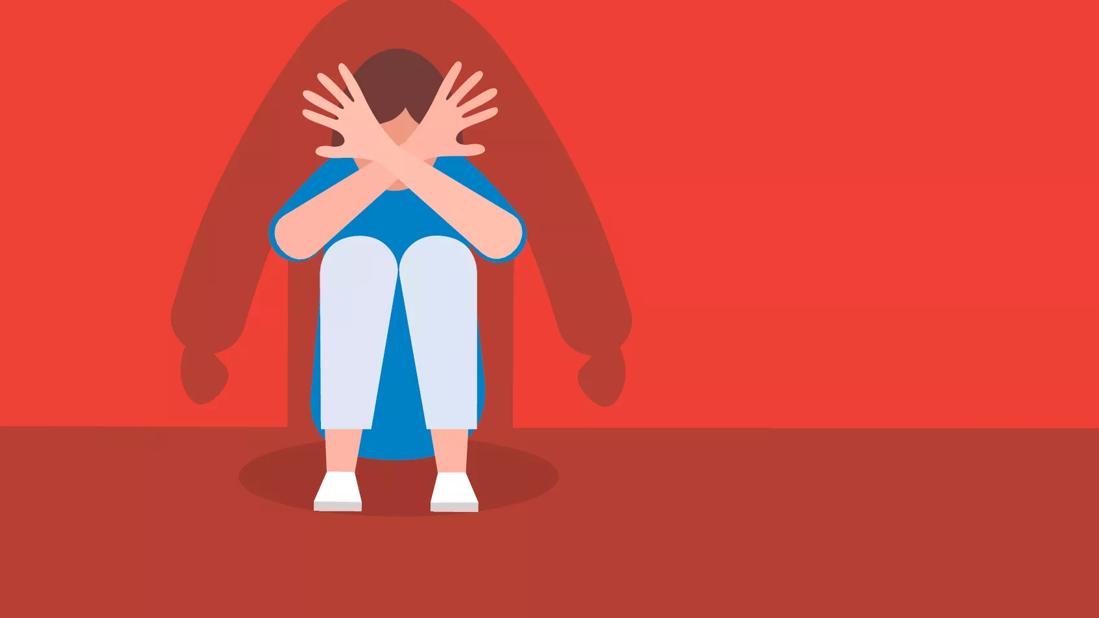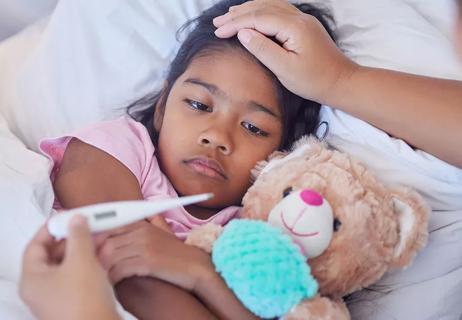Requesting information about your school’s safety plan is so important

As a parent, you want to make sure your children are healthy, safe and supported when you send them off to school in the morning. You also expect your kids will come home safely at the end of the day. Unfortunately, the increase in school violence over the last 20 years may bring up anxiety and concern over your children’s safety — and you’re not alone.
Advertisement
Cleveland Clinic is a non-profit academic medical center. Advertising on our site helps support our mission. We do not endorse non-Cleveland Clinic products or services. Policy
The U.S. federal government doesn’t track school shootings. But according to The Washington Post, since the Columbine High School shooting in 1999, 311,000 students have experienced gun violence at school. And in 2021, there were 42 shootings on K-12 campuses — more than any other year since 1999.
When these traumatic events happen, it’s understandable why your anxiety might be high regarding your kids’ safety. How can you ensure they’ll be safe? How should you address questions from your kids about these events? And how can you make sure you’re strong enough to support them through these difficult moments?
Psychiatrist Molly Wimbiscus, MD, shares what you can do when you’re concerned for your child’s safety and how to approach the conversation with your kids about school violence.
Talking to your kids about traumatic events can be challenging. Where do you even begin? And how protective should you be about providing information? According to Dr. Wimbiscus, it’s all about making sure your child continues to feel safe.
“You want to set the framework so your kids feel safe when they go to school,” says Dr. Wimbiscus.
Here’s how you can help steer the conversation.
It’s easy to feel overwhelmed by the outpouring of news surrounding school shootings. Research suggests schools are actually much safer than they appear especially when interventions like school safety plans are put in place and followed. But more importantly, for your child’s continued development and emotional and mental health, it’s important they continue to feel safe at school.
Advertisement
“It’s important to have them understand their school is a safe place because maintaining normalcy and maintaining your routine is so critical for stability,” says Dr. Wimbiscus. “When our routines change abruptly, our anxiety only grows and then we have a much harder time resetting and getting back into our routine.”
Maintain strong relationships with your school educators and community members by getting involved with school activities and attending town halls and safety meetings. Then, reinforce that there are teams of adults in place who will do absolutely anything to protect your child should a tragic event happen.
“Set the framework that they are surrounded by loving teachers and staff members within their schools who are educated and trained and who will do anything in their power to make sure they are safe,” says Dr. Wimbiscus.
Avoiding any conversation about what’s happened can be harmful. Your child may have questions of their own. They may also be experiencing feelings of fear, anxiousness or doubt that can be confusing and hard to process.
“It’s not uncommon for a child to say, ‘I’m scared,’ for a few weeks after a tragedy. It’s a normal reaction and it normally lessens with time and distance from the event,” notes Dr. Wimbiscus.
But having a conversation early on about what’s happened and how they’re feeling could help simplify that process. Knowledge, after all, is power.
For older children in middle school or high school, you’ll want to ask them what they understand about the situation. Give them the space to explain how they’re processing the event and talk about how they’re feeling. If they have any specific questions, it’s good to let them know you’re there to answer them and provide whatever they need.
“Many kids are living in communities with violence and they’re quite aware of the traumas associated with gun violence and other types of violence. So, it’s important for them to be able to discuss that,” says Dr. Wimbiscus.
For younger children in elementary school or preschool, it’s important to be direct. You may want to spare the details and try to avoid any images of the event of TV coverage. Instead, explain that something bad may have happened and reinforce the idea that you’re there to protect them. If they have questions, make sure you’re able to answer them the best you can while maintaining a positive attitude.
“The best outcome for a child is to have at least one supportive adult they trust who will help filter the information of what’s happening and provide reassurance,” says Dr. Wimbiscus.
Advertisement
In this day and age, information travels fast. Kids will talk to each other about what’s happening, and there’s an excess of information online and on social media. For this reason, you should have the conversation about what’s happened as early as possible to avoid disinformation and the buildup of fear and anxiety.
“Setting the stage is so important,” says Dr. Wimbiscus. “It’s far better for your child to hear from you that they’re safe and loved and that adults will do the very best to take care of them.”
When you see something terrible happening in the news, it’s easy to want to pull your child out of school or check in with them immediately to make sure they’re safe.
“There’s risk in over checking. It’s a hard place to be as a parent because your anxiety is also normal. It’s OK to respect your needs as an adult, to have that fear and that sense of urgency to make sure your child is safe,” says Dr. Wimbiscus. “The challenge is making sure it doesn’t become a burden for your child by agitating or increasing your child’s anxiety.”
If you feel your school isn’t being communicative enough about student events and its safety plans, you should connect with your principal or guidance office about ways to improve that communication.
Advertisement
When it comes to checking in with your child, maintain the normal relationship you’ve already established. Some parents drop their kids off at school and refrain from further communication until they pick them up at the end of the day. Other parents may text their children during the day and have them check in during lunch or study hall. As long as your child is respecting the school’s use of electronics and you’re maintaining that sense of normalcy you’ve established with them, you’re doing the right thing.
“Calling or removing the child from school and keeping them out for a while may not be in the best interest of your child,” cautions Dr. Wimbiscus. “Instead, you want to try to maintain the typical and normal communication style you already have.”
Having a cellphone at school couldn’t hurt, but you may want to consider a few guidelines before establishing that connection. The important thing is that your child follows school rules regarding using electronics while in class.
The other thing to consider (and something that may put you at ease) is that many kids have access to email while at school. Emails can sometimes be used in case of emergencies, and they’re often monitored by school officials for inappropriate behavior and high-risk assessment.
Advertisement
“There are systems in place that will immediately alert school staff to assess the situation,” says Dr. Wimbiscus.
All schools have safety plans in place in case of emergencies. These safety plans are followed during natural disasters, when a staff member or community member experiences a death or accident on a school campus, or when a tragic event involving school violence occurs. Often, a school district will have a service director or safety director in place to oversee the operations of a safety plan. School faculty and staff are then trained to follow the guidelines put in place in case of a crisis.
“Kids are trained to respond differently to crisis situations in different districts,” explains Dr. Wimbiscus. “A really important part of training the kids is not increasing anxiety and trauma associated with the training.”
If you want to know more about your school’s safety plans, some important questions to ask your principal or guidance counselor might include:
If your child has experienced a crisis at school, there are a few things you can do to help them (and yourself) on a path to recovery.
When a crisis happens, it’s normal to experience heightened anxiety, nightmares, lack of sleep, feelings of illness and lack of appetite.
“These are all normal biological responses to trauma,” assures Dr. Wimbiscus. “But if these go on for too long, you should talk to your doctor and make sure you’re doing everything you can to maintain your natural biological rhythms.”
Focusing on taking care of the simple, day-to-day needs of diet, sleep, exercise and social activities are important because it helps get you back to normal, healthy activities. Stay close to family and friends who love you. Try to keep up with healthy meals throughout the day. Or get involved with trauma-informed practices like yoga. Whatever you do, your basic health and the health of your child should be front and center.
“If you’ve been in the midst of a crisis, there’s typically a trauma response team that will come to the school and support students, staff and families,” says Dr. Wimbiscus. “These professionals will come in and are available for debriefing and for brief trauma-focused therapy. If someone is identified who needs more ongoing care, there are different trauma therapists who can be available.”
A healthcare provider can help address ongoing PTSD and help manage your child’s anxiety. You may also want to seek further medical attention if your child exhibits prolonged, extensive changes in their behavior such as:
“Our greatest risk for our youth is not violence from others; it’s the risk of self-harm or suicide,” stresses Dr. Wimbiscus.
According to a 2018 report from the Centers for Disease Control and Prevention (CDC), suicide is the second leading cause of death among 10- to 24-year-olds.
“One fact we do know is that asking your child about suicide does not increase their risk for suicide,” says Dr. Wimbiscus. “It’s OK to say, ‘Are you having any thoughts of not wanting to be alive? Are you having any thoughts of hurting yourself?’”
If you’re concerned about your child’s ability to self-harm or if they’re having suicidal thoughts, you should have them assessed by a healthcare professional as soon as possible.
You can do this by limiting access to news coverage or social media related to the traumatic event that happened. When doing this, it’s important to maintain open forms of communication with your child. But it’s important to note: Not everyone can talk about what happened.
“Some people can’t talk about it because it’s too traumatic and retriggering,” says Dr. Wimbiscus. “You can’t force a conversation about trauma. You can’t force an intervention for trauma response. But there’s research that suggests the sooner interventions are put in place for someone who’s had serious trauma, the more they’ll experience improved long-term outcomes.”
If your child wants to talk about what happened, enter into that conversation with compassion, and reassure them that they’re safe and protected. But if your child isn’t ready, that’s OK. You can do a simple check-in by saying something as simple as:
“I know something really scary happened. I just want you to know I love you and I’m here for you. Sometimes, people don’t want to talk about scary things and you don’t have to talk about it. I’m going to take care of you and I’m here to answer any questions you have.”
If you need additional support, Dr. Wimbiscus suggests the following resources:
Learn more about our editorial process.
Advertisement

Preschool age is typically between 3 and 5 — but readiness may matter more

Asking questions, creating routines and setting schedules can help get students back on track

All states require DTaP, MMR, polio and chickenpox vaccines — healthcare providers recommend others, too

School can be stressful, even anxiety-provoking — get to the root of the concern and enlist help when needed

A well-balanced lunch should include a protein, whole grain, fruit and vegetables, and a healthy snack

‘Active shooter’ exercises may raise both awareness and anxiety

Focus on a positive mindset, strong study habits and healthy living

Vomiting and fevers are a hard no — other symptoms are a judgment call

Wearing a scarf, adjusting your outdoor activities and following your asthma treatment plan can help limit breathing problems

Your diet in the weeks, days and hours ahead of your race can power you to the finish line

When someone guilt trips you, they’re using emotionally manipulative behavior to try to get you to act a certain way